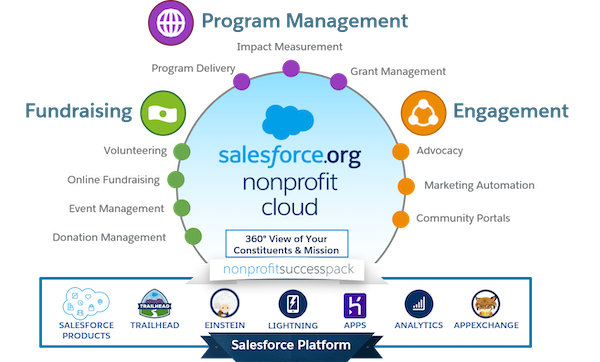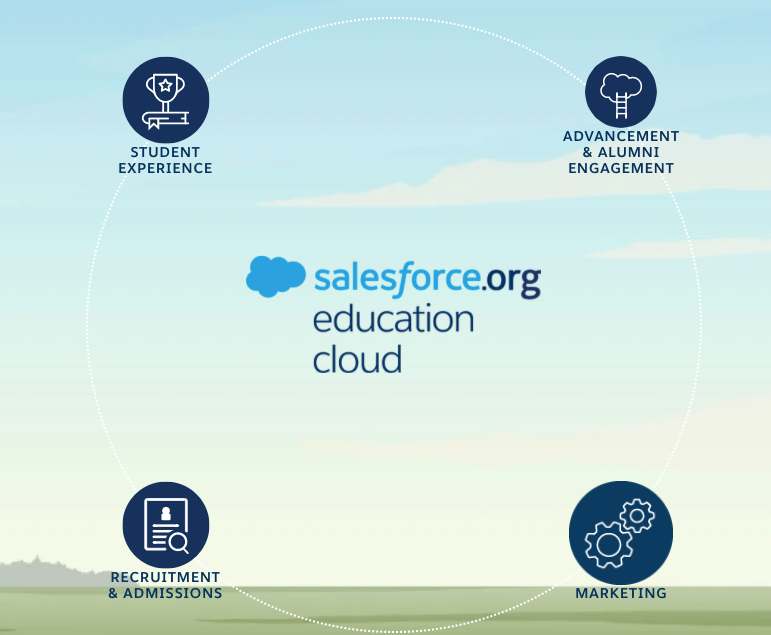What is a CRM?
A CRM is customer relationship management technology that helps nonprofits, educational institutions, and businesses manage their relationships with current and prospective constituents, students, and customers.
A CRM gives organizations the tools to streamline their operations, keep track of customer interactions, and unify data or team silos into a single source of truth. The best CRM tools offer one integrated platform that provides all your departments a single shared view of every customer, constituent, or student.
Mục lục bài viết
Who is a CRM for?
Don’t let the name fool you! Although it sounds like CRMs are specific to customers, robust CRM platforms like Salesforce encompass nearly every aspect of an institution or organization’s operations — from marketing and communications to analytics, fundraising to grants management, and student experience to recruitment and admissions.
Many CRMs offer a solution for just about every critical component of any successful nonprofit organization, educational institution, or business.
How Does a CRM Work?
CRM provides a single unified platform for every type of organization, whether you are a nonprofit or educational institution, and in every department, from your fundraising team to your marketing team to your recruitment and admissions team.
CRM can help you manage mission-critical functions for your school or nonprofit, such as:
- Managing marketing campaigns
- Unifying student communications
- Identifying prospective donors
- Storing constituent information
A CRM system works by collecting a constituent, donor, student, or potential supporter information. This information includes things like name, email, phone number, and social media handles, from across multiple sources and channels. Other information, such as recent news about a contact’s company, may also be automatically pulled into the account record. You can also add personalized information, like what time the person prefers communication or where you left off in your last conversation.
The benefits of a CRM that gathers this wealth and depth of information includes allowing you to store critical information in one single database to give you and your team a better understanding of this relationship over time.
Having this important information in one place is just the beginning. From there, you can manage daily interactions and communicate with your contacts in the right place, at the right time, and with the right message.
For example, if you are a nonprofit with a prospective donor who has engaged with your organization on social media or on your website, you have a wealth of backend information that informs your engagement and outreach efforts. Perhaps this means that you start with an email that explains more about your programs or an upcoming event before jumping straight to a donation ask, which can be off-putting.
Or for schools, you may have a prospective student who’s started her application for your institution, but never finished it. You know exactly where she is in the process and can see where she dropped off, which will better inform and personalize your communications in getting her back on track to complete her application.
Whether you’re an educational institution or a nonprofit organization, knowing when, where, and how to communicate with your donors or students is critical for building strong relationships and maximizing long-term growth — and a CRM can be your best tool in doing that.
Why Use a CRM?
If the COVID-19 pandemic proved one thing, it’s that organizations and institutions with a strong digital infrastructure are not only better equipped to overcome challenges, they’re also better positioned for long-term growth.
Having an end-to-end technology solution that can help teams drive growth is especially important for nonprofits and educational institutions where teams are often asked to do more with less.
A CRM can streamline manual processes while also CRM increasing the productivity of your team. A CRM enables your faculty and staff to spend more time with their students and your engagement team to focus on creating an excellent donor experience.
By investing in a CRM now, you’re setting your team and your organization up for a long-term return on your investment and sustained growth.
Advantages of a CRM
Given that CRM is the fastest-growing enterprise application software category, more companies are making the decision to digitize and unify their operations everyday. For growth-minded organizations, CRMs offer the digital infrastructure, the data-driven culture, and the customer support that are key to creating long-term success.
Cloud-based CRMs, like Salesforce, combine the power of a CRM with the revolutionary convenience of cloud computing. By moving a CRM from on-premise software into the cloud, you’re storing all your information remotely and accessing it via the internet on any device instead of through a desktop application that needs to be installed.
Cloud-based CRMs mean that you don’t need to worry about installing software on countless computers, tablets, or mobile devices. On top of not having to worry about installing software on every device you own, there are added benefits to having everything online in a secure environment, such as:
- More accessible database
- Solicit the help of third party service providers
- Lower costs
- More environmentally-friendly option that doesn’t add unnecessary waste
Over the past few years, organizations across all industries have seen the benefit in prioritizing digital transformation and relying on data-driven decision making. This sea change has provided digitally-minded organizations the ability to impact every level of their business – from reliably forecasting fundraising, to tracking product success, and optimizing marketing and communications efforts. One of the biggest advantages of a CRM is that you can do all of this in one central location.
Benefits of a CRM for Nonprofits
A CRM for nonprofits is the same as a CRM for for-profits — but with a focus on donors, fundraising, grantmaking, and program management. Nonprofit-centric CRMs, like Salesforce.org’s Nonprofit Cloud, which was built with and for our trailblazing nonprofit community, are the embodiment of using tech for good.
Nonprofit Cloud is a single integrated platform that helps nonprofits connect every integral aspect of an organization. By unifying fundraising, program management, marketing, and grantmaking, Nonprofit Cloud enables teams to deliver exceptional donor experiences that result in maximum mission impact.
 Nonprofit Cloud is a single integrated platform that helps nonprofits connect every integral aspect of their work.
Nonprofit Cloud is a single integrated platform that helps nonprofits connect every integral aspect of their work.
For the social sector in particular, using digital tools like CRMs is essential for connecting effectively with constituents and prospective donors. Recent reports show that organizations that rely on a strong digital infrastructure and are savvy, data-driven decision makers are not only more effective at pivoting operations at the onset of a crisis, they are also more likely to have won grant increases, and are more positive about the future.
Nonprofit organizations are using CRM technology in countless impactful ways to make meaningful change and create lasting impact — from connecting with the next generation of donors to accelerating vaccine management to reducing the education gap for girls across the world.
Learn more about Nonprofit Cloud or watch a demo.
Benefits of a CRM for Universities and Schools
Educational institutions — from kindergarten and elementary schools to colleges and universities — use a CRM to unify and streamline communications with current and prospective students. Salesforce.org’s Education Cloud helps schools drive both learner and institution success by enabling a complete view of every student with digital-first engagements across the entire learner lifecycle.
By collecting a wealth of otherwise lost student and prospective student information, tracking interactions, and segmenting contacts by group to automate your communications, schools get a holistic view of every student they’ve been in contact with. In addition to assisting schools with enrollment and student communications, educational institutions can use a CRM to assist in other mission-critical areas like student admissions, marketing and engagement, student advising, an enhanced student experience, and reporting and analytics.
 Salesforce.org’s Education Cloud helps schools drive both learner and institution success by enabling a complete view of every student across the entire learner lifecycle.
Salesforce.org’s Education Cloud helps schools drive both learner and institution success by enabling a complete view of every student across the entire learner lifecycle.
In an increasingly digital world, it’s more important than ever to have the modern digital tools necessary to be efficient, predictive, and strategic.











